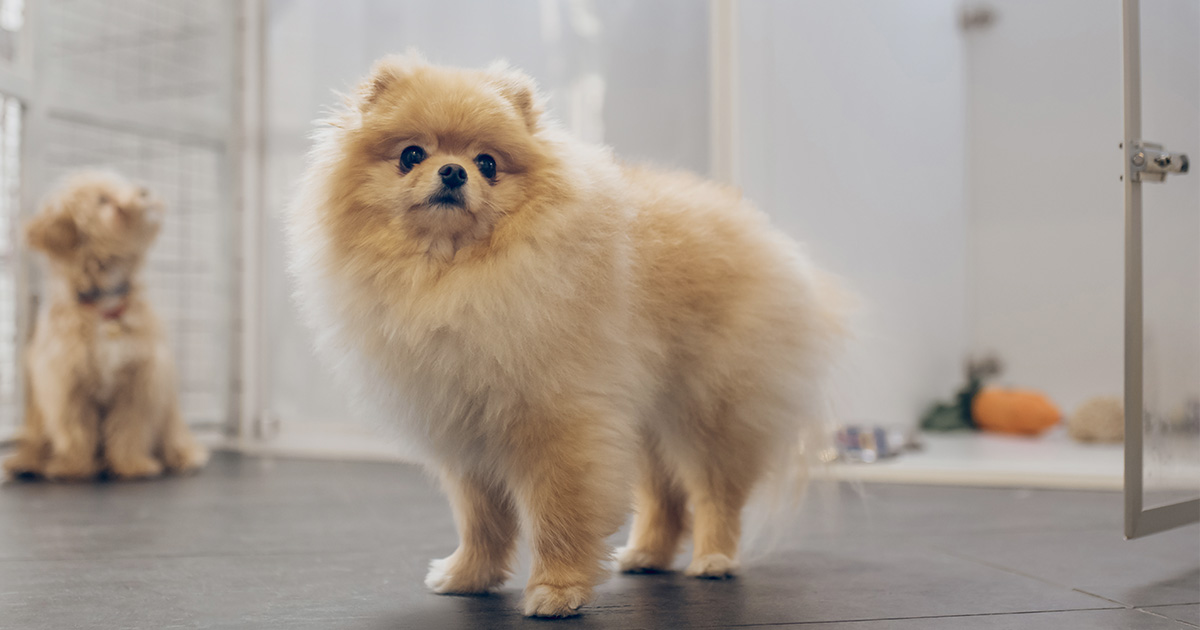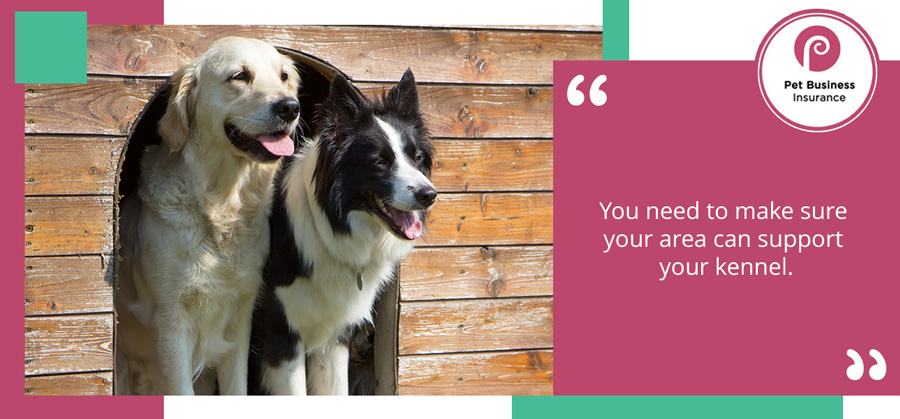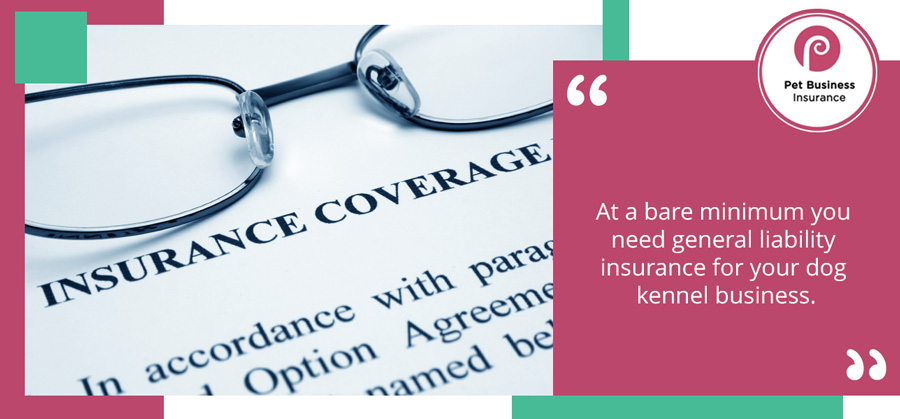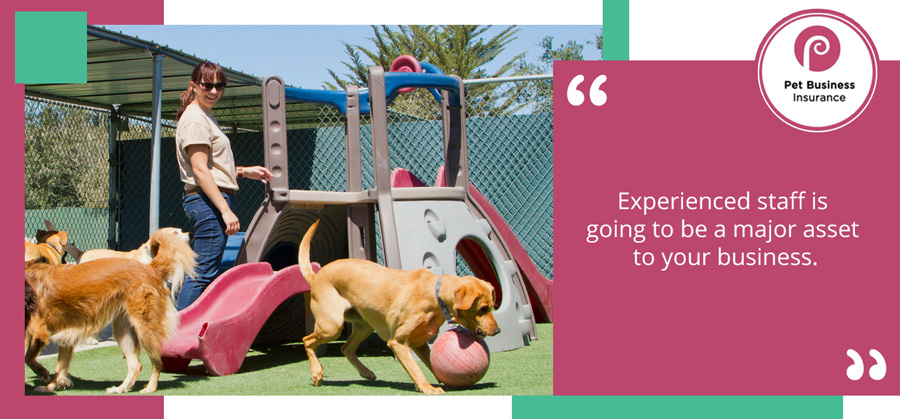
Unless people can take their dogs with them on holiday, their next best option is to find them their own doggy hotel. Here your furry friend is pampered, exercised, and given all the belly rubs, love, and the top-quality food he requires.
Interested in starting a dog kennel business? The possibilities are endless, and the market is ever-growing. So, what’s the best way to do it – should you start a dog boarding business at home or find a location to start a dog kennel business?
How Much Does it Cost to Start a Dog Daycare?
Opening a dog kennel business or dog daycare can vary greatly in cost depending on if you’re opening an at home business or using an external location. Here are some of the expenses you can expect:
- Business insurance
- Property insurance
- Commercial lease or purchase
- Facility construction and set up costs
- Basic equipment
- Advertising both online and offline
- Fees, licenses, training and software
- Utilities
- Staff
- Optional extras (specialty equipment for grooming, training, etc.)
Location, location, location
You need to identify options for a location in advance of writing your business plan because it can impact your strategy and approach. A few things to consider:
- Will you be renting a commercial space or buying?
- Will you run your dog kennel business from home or at a location?
- What part of town is your business located in?
You need to make sure your area can support your kennel. It’ll create unnecessary stress setting up a five-star dog kennel with corresponding prices when your local client market wants a mid-market doggy daycare with some overnight boarding options.
You can go for the star experience, complete with things like spa treatments, pedicures, massages, wagyu beef treats and corresponding prices but if you’re located in a rough area, you may not find success.
Although it may be more expensive to set up shop in a high street location, you can charge accordingly for an upscale doggie daycare experience. For example, being the first to bring in a popular overseas trend can make your name and fortune, and there’s a market for exclusivity.
If you aim more for the middle of the road market, where people want a touch of luxury but not if it breaks their bank accounts, you can have larger premises and a bigger intake of dogs. In this market, doggy day-care alongside long term boarding is going to be a great target for you.
The reverse is also true. Set your bar too low when your local area is in need of a luxury dog kennel, and you’ve limited your income before you’ve opened your doors.
Top Target Market Tip: Research your area thoroughly before deciding. Don’t rush this step and base your decision on data, not a ‘feeling’ or emotion.

Create a Business Plan
Setting up a dog kennel business properly is a costly exercise, and you’ll need financial backing. A good business plan can give you, and those interested in investing, confidence that you’ve done your due diligence and can forecast success.
Filling out an estimate of costs, like the ones outlined above, can give you an idea of your monthly outgoing expenses and then you can run projections based on your capacity and fees. Keep in mind that it’s often rare for a business to run at full capacity all the time so create different scenarios based on what your income can look like at 50% capacity, 60% and 75%.
Having a business plan with defined, achievable goals, deadlines and projects makes your business more likely to succeed and grow.
Take out a Good Insurance Policy
At a bare minimum you need general liability insurance for your dog kennel business. It’s not just good business sense, it’s a legal and licensing requirement for most local authorities.
If you have any employees or volunteers, you’ll need employer’s liability insurance. The other main core policy you’ll want is for professional indemnity.
You can get specific policies, especially for dog kennel insurance and work with the company to make sure it fits your needs. There are packages that cover every situation from vet call-out fees to theft and glass insurance. You’ll even get cover for losing your keys to the kennels and needing an emergency locksmith.
Top Insurance Tip: If you have employees onsite, make sure you get good personal belonging insurance as well.

Get your Dog Boarding Licence
In 2018 new licencing regulations came into force in England. Known as the Animal Activities Licensing Regulations 2018 (AAL), the changes are broad and strictly enforced.
Right now, these regulations only impact England, but it’s likely Scotland, Northern Ireland and Wales will do the same in the future. Following the Higher Standards on the English guidelines is a good way to future proof your business if you’re outside of England.
In order to start a dog a kennel business, you’ll need to apply for a license from your local authority.
- Your license conditions will stipulate how long your license is valid for, staff and training, how many animals you can board, and the conditions they must be kept in.
- You’ll need to ensure your kennels are up to standard and display your license both at the kennels and on your website.
- A license can be issued for 1, 2 or 3 years, and your kennels will be inspected at least once during your license term.
- The inspection will cover everything related to the kennels from the pen size to the office paperwork.
- The license fee varies depending on the council. Running a boarding kennel without a valid license can result in a fine and 6 months imprisonment.
- In England, your kennel will receive a star rating, which is displayed on your license.
Top licensing tip: You can read through all the licensing requirements online. If you’re aiming for an upmarket or mid-market kennel, you’ll need to achieve the Higher Standard sections.
Organize Your Internal Structure
Working in dog kennels is a physical job, and you’ll be constantly on the move.
From the physical work of cleaning and maintaining kennels to dealing with clients, checking paperwork, and admin work, you’ll be busy day to day.
Setting up processes and automating some of your workflow will be the smartest process for running dog kennels smoothly.
Here are some important considerations:
- Create policies that cover everything from
- Set up staff training documentation and processes.
- Create a game plan for emergencies – whether that’s for dog fights or
- Find the right ratio of dog kennels to outdoor space and dogs to staff
- Establish off-hours checks for overnight boarders
While certificates and qualifications aren’t a legal requirement to work in a dog kennel, experienced staff is going to be a major asset to your business. If they have the expertise to reassure customers, and the experience to handle different dogs, it will speak volumes to helping establish you as a serious contender.
Get Hands-On Experience First
Getting a certificate in dog training and behavior is an excellent start in your new career, and a nice addition to your website, but you can’t beat actual hands-on experience.
Spend a few months volunteering or working at a kennel facility yourself to get an idea of what the business is like. It will show you what pitfalls to avoid, and how to get the best out of your staff when your business opens up.
Take notes on what worked, what didn’t, and what should’ve been done. It’s always easier to make a judgement call when you’re not emotionally invested, and that’s what you’re doing here.
Top Experience Tip: Don’t burn your bridges when you leave! Kennels often get full at peak times and will recommend other places to potential clients.

Set up an Online Presence
The first thing a customer does when they’re searching for a local business is go online. The second thing they’ll do is check reviews and explore your website.
Make sure you’ve got your website up and running with a valid contact number and email address. Spend some money and hire a website designer; preferably one who will take over the headache of sorting out hosting and site maintenance for you. Finding a digital marketer who can get your site visible locally will be key, and you may want to consider running some local ads to spread the word.
Hire a photographer to make sure you have great, high-quality pictures of the kennels and any of the services you offer that will draw in customers. Highlight your key features and display your certifications and your dog kennel insurance to maintain professionalism.
Top tip: Doggy cams are a huge draw for customers. They can jump online and see their pup in the communal play areas, and even their pen, depending on your setup. It’s a great way to reassure that a dog is getting the best care and living her best life, even without their favorite human around. This is a great way to set up trust and encourage loyalty to your facility once your customers have had a good experience.
Have a Vet on Call
One of your biggest allies is going to be your local vet. You need a vet to deal with everyday issues like long-term boarders that need medical attention, dogs with chronic conditions, or injuries.
Top Vet Tip: If possible, find a vet that will make on-site calls. This will result in less stress to the animal, which is always a good thing. These calls might be covered by your insurance policy, depending on your coverage.
Owning a dog kennel can be one of the most entertaining, frustrating, and rewarding things you do, all on the same day.
Starting a Dog Boarding Business from Home
Starting a dog boarding business from home can be a cost-effective alternative to renting or buying a commercial space to set up your business. From lower overhead costs to enjoying the comfort of working from your own home, there are several benefits to set up your business from home. However, there are a strict set of standards that you will have to meet in order to qualify for a boarding licence.
In order to set up a dog kennel at home, you will need sufficient garden space and provide a suitable living environment for each dog. You may need planning permission if you are going to make significant changes to your home.
As a guideline, dogs cannot be home boarded in:
- a conservatory
- a bedroom in which the usual occupant is below the age of 16
- a garage (unless converted to a standard suitable for a human to live in)
- a cupboard
- a cellar (unless converted to a standard suitable for a human to live in)
- a loft (unless converted to a standard suitable for a human to live in)
- a balcony
- an outside building, structure or shed
It’s important to do your research and consider whether you are willing to commit to turning your home into a place of business.
How Many Dogs Can I Board in my Home?
Your home boarding for dogs licence will state the number of dogs that you can house at any given time. This will depend on the number of rooms or kennels you have available, as well as the facilities and number of staff members you have on site.
An Average Workday in a Dog Kennel
An average morning in the kennel can have a checklist ten items long or more:
- Feeding and administering medications if needed
- Pen cleaning
- Checking if any dogs are feeling under the weather and need a vet check
- Getting the dogs out for morning exercise
- Responding to phone and email queries
- Opening the doors to onsite customer drop off and pick up
- Doing a stock check
Meanwhile the Great Dane with separation anxiety just ate his bedding for the third time this week because the Chihuahua he bonded with went home and nobody else wants to be his cuddle bunny, and it turns out the St. Bernard that came in yesterday has a special hatred for the mailman and can’t be outside for fresh air exercise during mail delivery.
While you deal with demanding dog parents, you’re sorting out staffing schedules, doggie pickups and drop-offs, invoicing and payments, marketing and social media posts. If you thrive in a busy, non-stop environment, starting a dog kennel business is for you! Otherwise, why not consider starting a dog walking business?